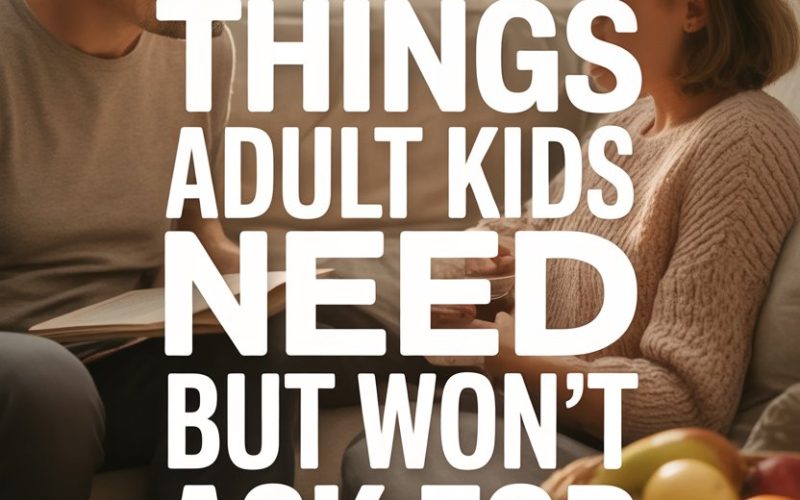Once your kids hit adulthood, you’d think your days of deciphering cryptic messages and silent treatments were over.
Turns out, grown-up children are just as mysterious—only now, the stakes involve careers, heartbreak, and late-night existential dread instead of lost teddy bears.
If you’re still waiting for your thirty-year-old to request help outright, don’t hold your breath. Grown kids are famously tight-lipped when it comes to asking their parents for what they really need.
Out of pride? Independence? Sheer stubbornness? Probably all three.
Here’s what your adult offspring secretly wish you’d do—no dramatic monologues or awkward family meetings required.
1. Respect Without Disappearing
You gave them wings, and now they’re using them. (Maybe a little clumsily, but hey, flying is hard.)
Adult children crave respect for their independence. But they don’t want you to vanish like a magician at a child’s birthday party.
They may not invite you to every detail of their lives, but knowing you trust their choices means everything. Show faith in their judgment—even when you’re privately Googling “Is it normal to eat only pasta at 27?”
Offer advice only when they ask. And if you’re dying to check in, try a no-pressure text: “Just wondering how your week’s going—no need to reply if you’re busy.”
That’s how you stay present without hovering.
The message? I see you. I respect you. I’m not going anywhere.
2. Unconditional Encouragement, Minus the Gold Stars
Turns out, adulting is a lot harder than it looked from the high chair. Even the most put-together grown-ups wrestle with self-doubt.
When your child was small, you probably clapped for every painted rock and macaroni necklace. Now? They secretly still want that cheerleader—just with less glitter, please.
Think less “You’re the best at everything!” and more “I’m proud of how hard you’re trying.” Offer encouragement that acknowledges their effort, not just their wins.
Send a text when they mention a tough week at work. Applaud their resilience after a breakup or a career nosedive. Even if they roll their eyes, your faith will stick.
According to a Psychology expert, adults who feel supported by their parents report higher life satisfaction and better coping skills.
Turns out, you never actually outgrow the need for a safe, encouraging presence—who knew?
3. Permission to Be Imperfect
They might look like functioning adults on the outside, but inside, many are one bad day away from hiding under the doona.
The pressure to have it all sorted—career, relationships, monthly budget, houseplants that aren’t dead—can be overwhelming.
Adult kids need to hear, sometimes out loud, that you don’t expect perfection. Tell them you made mistakes at their age (bonus points for the most cringe-worthy story).
Laugh about the time you locked your keys in the car or got sacked from your first job. You’re not just sharing family lore—you’re giving them permission to stumble without shame.
Don’t rescue them from every mess, but don’t pile on with “I told you so” either.
The grown-up world is brutal enough. Be the soft place they land, not the judge waiting with a red pen.
4. A Listening Ear That Doesn’t Fix or Lecture
If your offspring wanted a TED Talk on “How to Sort Your Life Out,” they’d probably just watch one. What they need is someone to listen without leaping into advice mode or telling them what they should have done.
Try this: when they call complaining about their boss/partner/flatmate, resist the urge to offer solutions or compare it to your own “back in my day” saga. Just listen. Nod (even on the phone—they’ll feel it).
If you must say something, try “That sounds rough. Want to talk it out, or just vent?”
Research from the Harvard Study of Adult Development shows that supportive listening strengthens family bonds well into adulthood. Even if you’re bursting with wisdom, sometimes all they want is to be heard.
5. Gentle Interest in Their World
You might not understand their obsession with craft beer, rescue chickens, or that mysterious “crypto thing,” but showing curiosity about their passions sends a powerful message: I care about what matters to you, even if it makes no sense to me.
Ask questions about their hobbies, work projects, or binge-worthy TV dramas.
Share a meme relevant to their interests (bonus points if you know how to use Instagram DMs). Attend the odd trivia night or art show, even if you’d rather be home in slippers, watching reruns.
It’s not about morphing into their best mate. You’re showing you care about who they are now—not just the person who used to eat crumpets at your kitchen table.
6. Reassurance That You’re Okay, Too
Worry comes with the parenting territory. But often, grown-up children worry about you just as much—they just won’t say it.
Are you lonely? Bored? Secretly hoarding seventeen cats? (Well, maybe not that last one. Unless you are. In which case, congratulations on your very fluffy household.)
Let them know you’re doing well, making friends, and finding fulfillment outside of your role as “Mum” or “Dad.”
Share your own adventures, big or small. This reassures them that they don’t have to prop you up, or put their lives on hold out of guilt.
Experts say that adult children thrive when they know their parents are happy and emotionally well. It gives them permission to focus on their own journeys, without second-guessing every move.
7. Forgiveness for the Awkward Bits
Nobody gets through the parent-child relationship without a few bumps.
Maybe you accidentally overshared at a dinner party. Maybe you clashed over life choices, hairstyles, or politics. Maybe you called their ex “what’s-his-face” one too many times.
Your adult child may want to move forward, but find it hard to bring up old hurts.
Be willing to apologize, even if you’re not sure what you did. Say, “If I ever made you feel X, I’m sorry.” Model the kind of grown-up conversation you wish you’d had years ago.
Forgiveness, as family therapist Dr. Joshua Coleman points out, is the foundation of healthy adult relationships. Sometimes you have to go first—awkwardly, imperfectly, but sincerely.
The Secret Requests They Won’t Voice
Adult children can be stubborn creatures. They’ll claim they’re fine, communicate mostly in memes, and insist they absolutely do not need a pep talk.
Underneath, they’re still looking for validation, support, and connection—just without the sticker charts and packed school lunches.
Your mission: keep offering those invisible comforts, on their terms. It may not always be glamorous, but hey, that’s parenting for you.
Don’t be surprised if, one day, they thank you. (Probably with a text. Three words. No punctuation.)
Take it as the highest compliment.




